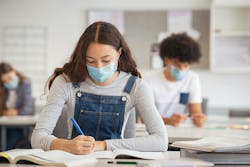Early in the COVID-19 pandemic, more than 1,300 students enrolled in a three-week summer immersion course, “The Pandemic: Science and Society,” at Washington University in St. Louis. The innovative course envisioned by Feng Sheng Hu, the Richard G. Engelsmann Dean of Arts & Sciences, brought together experts from across WashU and around the country.
A new study published in the journal Humanities & Social Sciences Communication examines the course’s impact and implications for effective public health messaging for university students going forward.
Reviewing data submitted three months after the course concluded, researchers found a person’s preferred information sources made a difference in their level of knowledge, risk perception and protective behaviors. People with higher COVID knowledge practiced more protective behaviors during the fall 2020 semester.
The course was free to all full-time WashU students and ran from August 17-September 4, 2020. Students from all WashU schools participated in online lectures and discussion boards, completed quizzes and created a piece of communication — either a video, an infographic, a letter to the editor or a work of art — about the virus. Students shared their work on social media using the hashtag #COVIDcourse.
The new study analyzed data from nearly 1,000 anonymous questionnaires. The majority of respondents were WashU students (83%). About half of the respondents took the course, and another 26% had some exposure to course content, either by watching lectures online or hearing from others who attended.
Respondents said their top sources of COVID-19 information were family (52%), official health organization websites (50%), news media (47.4%), friends (38.6%) and the pandemic course (32.4%). Of these, health organizations and the course were associated with higher levels of COVID knowledge, more accurate risk perception and stronger protective behaviors.





